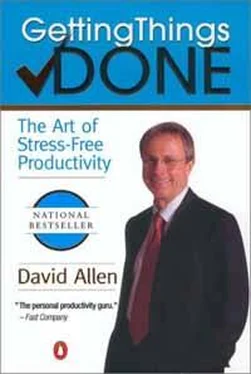The telephone/address section of most of the organizers sold in the last fifty years is probably (along with the calendar) their most commonly used component. Everyone needs to keep track of phone numbers. It's instructive to note that this is purely and simply reference material. No action is required—this is just information that you might need to access in the future.
So there's no big mystery about how to organize it, aside from the logistics for your individual needs. Again, the only problem comes up when people try to make their Rolodexes serve as tools for reminding them about things they need to do. That doesn't work. As long as all the actions relative to people you know have been identified and tracked in your action reminder lists, there's no role for telephone and address systems to fill other than being a neutral address book.
The only issue then becomes how much information you need to keep and where and in what equipment you need to keep it in order to have it accessible when you want it. Nothing's perfect in that regard, but as the small digital tools become easier to use and connect to larger databases, you'll be able to have more information at hand with the same or less effort.
Libraries and Archives: Personalized Levels Information that might be useful lives at many levels. You could probably find out pretty much anything if you were willing to dig deep enough. The question of how much to keep, how close, and in what form, will be a changing reality, given the variables of your needs and your particular comfort levels with data. Relative to your personal organization and productivity, this is not a core issue, so long as all of your projects and actions are in a control system that you work with regularly. Reference material in all its forms then becomes nothing more or less than material to capture and create access to according to your particular proclivities and requirements.
If material is purely for reference, the only issue is whether it's worth the time and space required to keep it.
Some degree of consistency will always make things easier. What kinds of things do you need with you all the time? Those must go into your ubiquitous planner or PDA. What do you need specifically for meetings or off-site events? That should be put into your briefcase, pack, satchel, or purse. What might you need when you're working in your office? That should be put into your personal filing system or your networked computer. What about rare situations relative to your job? Material needed for those could be archived in departmental files or off-site storage. What could you find anytime you might need it, on the Web? You don't need to do anything with that information, unless you need it when you're away from a Web connection, in which case you should print the data out when you're online and store it in a file you can take with you.
Do you see how that personal organization of reference material is simply a logistical issue? Distinguishing actionable things from nonactionable ones is the key success factor in this arena. Once you've done that, you have total freedom to manage and organize as much or as little reference material as you want. It's a highly individual decision that ought to be based on the ratio of the value received to the time and effort required to capture and maintain it.
Someday/Maybes
The last thing to deal with in your organization system is how to track things that you may want to reassess in the future. These could range from a special trip you might want to take one day, to books you might want to read, to projects you might want to tackle in the next fiscal year, to skills and talents you might want to develop. For a full implementation of this model you'll need some sort of "back burner" or "on hold" component.
Someday/Maybe's are not throwaway items. They may be some of the most interesting and creative things you'll ever get involved with.
There are several ways to stage things for later review, all of which will work to get them off your current radar and your mind. You can put the items on various versions of "Someday/Maybe" lists or trigger them on your calendar or in a paper-based "tickler" system.
"Someday/Maybe" List
It's highly likely that if you did a complete mind-sweep when you were collecting things out of your psychic RAM, you came up with some things you're not sure you want to commit to. "Learn Spanish," "Get Marcie a horse," "Climb Mt, Washington," and "Build a guest cottage" are typical projects that fall into this category.
If you haven't already done it, I recommend that you create a "Someday/Maybe" list in whatever organizing system you've chosen. Then give yourself permission to populate that list with all the items of that type that have occurred to you so far. You'll probably discover that simply having the list and starting to fill it out will cause you to come up with all kinds of creative ideas.
You may also be surprised to find that some of the things you write on the list will actually come to pass, almost without your making any conscious effort to make them happen. If you acknowledge the power of the imagination to foster changes in perception and performance, it's easy to see how having a "Someday/Maybe" list out in front of your conscious mind could potentially add many wonderful adventures to your life and work. We're likely to seize opportunities when they arise if we've already identified and captured them as a possibility. That has certainly been my own experience: learning to play the flute and how to sail big boats both started in this category for me. In addition to your in-basket, there are two rich sources to tap for your "Some-day/Maybe" list: your creative imagination and your list of current projects.
Make an Inventory of Your Creative Imaginings What are the things you really might want to do someday if you have the time, money, and inclination? Write them on your have "Someday/ Maybe" list. Typical categories include:
• Things to get or build for your home
• Hobbies to take up
• Skills to learn
• Creative expressions to explore
• Clothes and accessories to buy
• Toys (gear!) to acquire
• Trips to take
• Organizations to join
• Service projects to contribute to
• Things to see and do
Reassess Your Current Projects Now's a good time to review your "Projects" list from a more elevated perspective (that is, the standpoint of your job and goals) and consider whether you might transfer some of your current commitments to "Someday/Maybe." If on reflection you realize that an optional project doesn't have a chance of getting your attention for the next months or more, move it to this list.
What lies in our power to do, lies in our power not to do.
Special Categories of "Someday/Maybe"
More than likely you have some special interests that involve lots of possible things to do. It can be fun to collect these on lists. For instance:
• Food—recipes, menus, restaurants, wines
• Children—things to do with them
• Books to read
• CDs to buy
• Videos to buy/rent
• Cultural events to attend
• Gift ideas
• Garden ideas
• Web sites to surf
• Weekend trips to take
• Meeting ideas
• Party ideas
• Ideas—Misc. (meaning you don't know where else to put them!)
These kinds of lists can be a cross between reference and "Someday/Maybe"—reference because you can just collect and add to lists of good wines or restaurants or books, to consult as you like; "Someday/Maybe" because you might want to review the listed items on a regular basis to remind yourself to try one or more of them at some point.
In any case, this is another great reason to have an organizing system that makes it easy to capture things that may add value and variety and interest to your life—without clogging your mind and work space with undecided, unfinished business.
Читать дальше











